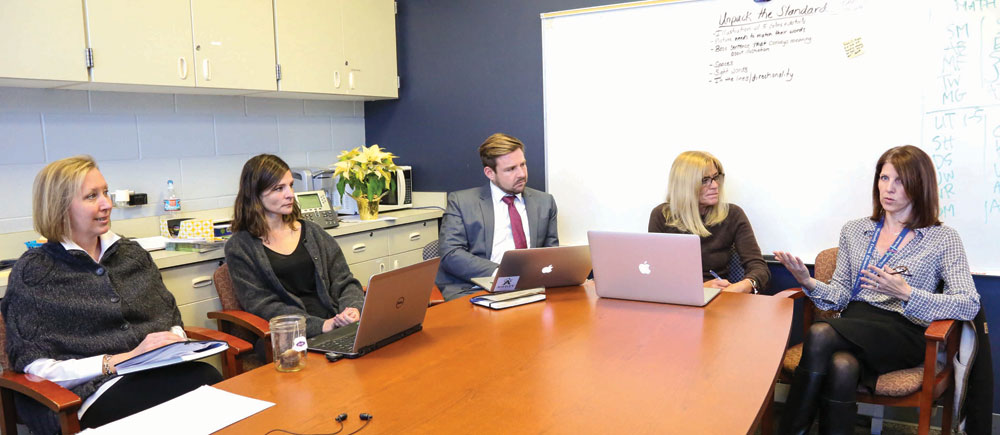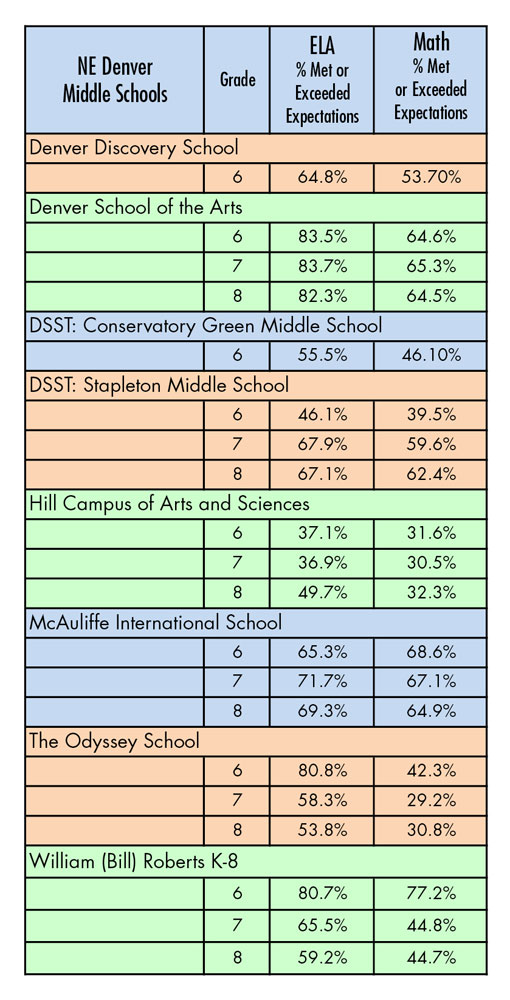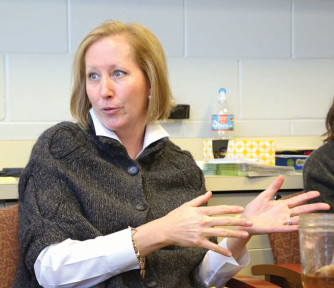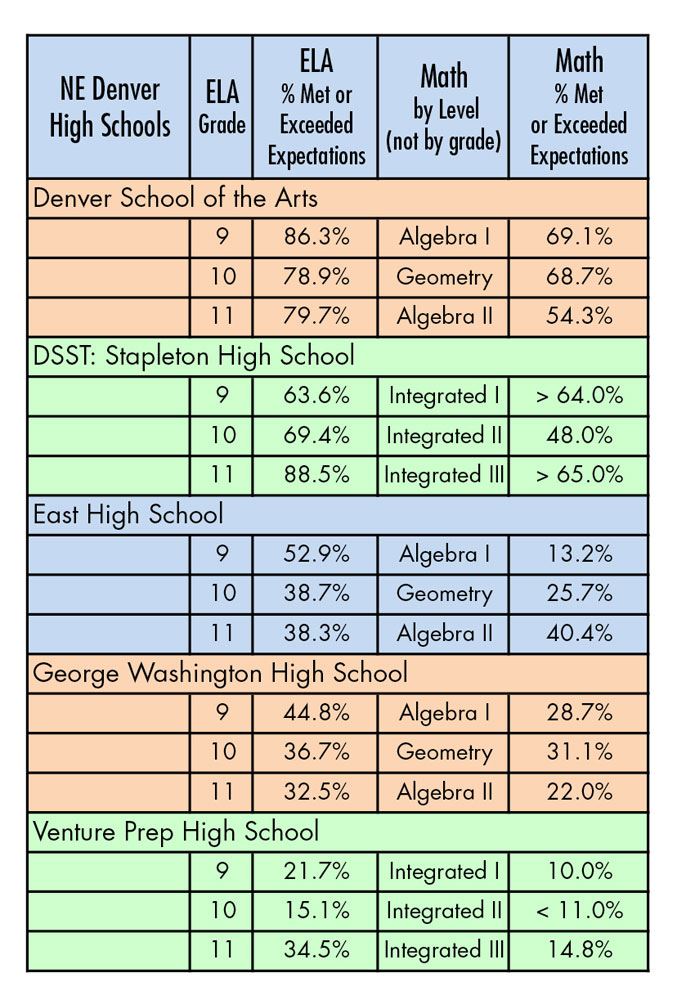
Westerly Creek Principal Jill Corcoran, math teacher Stacie Williamson, Ashley Elementary Principal Zachary Rahn, Bill Roberts Principal Patricia Lea, and Site Assessment Leader Kim Lewis.
 Local principals and teachers say they weren’t surprised by the newly released PARCC results, which had lower scores than prior tests. But, they point out, PARCC isn’t just harder, it’s fundamentally different. PARCC is considered a “next generation” assessment, a deliberate attempt to test in a different way, focusing more on problem solving, critical thinking and explanation—described by teachers as critical, real-life skills.
Local principals and teachers say they weren’t surprised by the newly released PARCC results, which had lower scores than prior tests. But, they point out, PARCC isn’t just harder, it’s fundamentally different. PARCC is considered a “next generation” assessment, a deliberate attempt to test in a different way, focusing more on problem solving, critical thinking and explanation—described by teachers as critical, real-life skills.

Patricia Lea
Westerly Creek Elementary School Principal Jill Corcoran says, “Students are asked to read, to comprehend, to organize, to answer a series of questions from different perspectives, to use evidence to support an answer.” Patricia Lea, Bill Roberts K-8 principal, supports that statement, saying, “There’s a lot of explaining required in this genre of a test. You have to defend a position. It’s a good approach, just as in real life.”
Denver Discovery middle school math teacher Mandy Hicks says, “One hundred percent of every second of every lesson I teach, I’m thinking about that test. Not because I am data-obsessed but because I know that is how we are measuring success and that’s how ultimately the kids will feel successful … We are trying to teach authentically and we are teaching for the long term … from my opinion as an educator that teaches these standards every day, this is the trajectory we should be on.” Kristen Atwood, DDS principal, says, “We truly do believe these (Common Core standards) are the guidelines for success in the 21st century.”

Zachary Rahn
However, Corcoran points out that the PARCC math test is especially difficult for elementary school children who are behind in literacy skills. She says students who could solve equations might have been able to get a proficient score on the old tests, but now they don’t have the language proficiency to explain how they reached their answer and why it’s correct. Ashley Principal Zachary Rahn cites the magnitude of the change for such students at Ashley Elementary, “Forty-seven percent of kids were proficient or advanced under TCAP in math two years ago. This year it was 9 percent.” Rahn explains that their turnaround philosophy at the school was to focus on literacy the first year so they didn’t spend as much time on math, but he also points out that what is demanded in the math assessment is greatly different than what it was in the prior tests—and Ashley’s drop in math scores was in line with what happened nationally.
 The PARCC assessment was given last spring to students in grades three through 11. It’s a computer-based test at all grade levels, requiring strong computer navigation skills. See page 12 to read this author’s experience taking a portion of the third grade test.
The PARCC assessment was given last spring to students in grades three through 11. It’s a computer-based test at all grade levels, requiring strong computer navigation skills. See page 12 to read this author’s experience taking a portion of the third grade test.
Although NE Denver schools enjoyed relatively high scores, substantial numbers of students, even majorities, didn’t “meet expectations.” This result did not seem to be a significant concern to the local educators with whom the Front Porch spoke. Teachers and principals say the PARCC results are providing the data needed to fine-tune teaching methods and content as Colorado educators continue to implement the Common Core standards.

Jill Corcoran
There seems to be wide acceptance that Common Core standards are raising the bar and the PARCC tests help teachers track achievement of the new standards. Ashley Principal Rahn says, “CMAS fundamentally changes the way we teach. We can now make data-based decisions.” Stacie Williamson, a math teacher at Westerly Creek Elementary, echoed that sentiment, saying, “The Common Core gives us something to teach to, and PARCC gives us the test on those standards. It’s just asking what we’ve taught.”
 The educators hope future scores will become available before summer so they can analyze the data to see the subject areas where their students were weak and strengthen their teaching in those areas—perhaps even finding a teacher whose students were strong in that area to share lesson plans.
The educators hope future scores will become available before summer so they can analyze the data to see the subject areas where their students were weak and strengthen their teaching in those areas—perhaps even finding a teacher whose students were strong in that area to share lesson plans.
Despite their acceptance of the test and the Common Core standards, the elementary teachers and principals have plenty to say about difficulties in implementation. Problems included not enough computers, bandwidth limitations forcing staggered test-taking times, and third-graders’ computer readiness given the typing and other skills needed. The job of logistics is so daunting that each school has a “SAL” or site assessment lead. The SAL coordinates test taking with the overall school and districtwide calendars. Kim Lewis, SAL at Westerly Creek Elementary, says, “Logistics are hugely complex, just finding 90-minute blocks of time and even enough test proctors (is difficult).”
Bill Roberts Principal Lea points out, and they all agree, the PARCC test is just one measure of their students. “I feel that kids need to have multiple ways to demonstrate or show us what they know … I know how college acceptances have changed. They have SATs, ACTs, they look at their grades, they look at what they do, are they into athletics or clubs? It is just not one thing.”
The PARCC English Language Arts (ELA) test requires three 75- to 90-minute test sessions; math requires four 60-minute sessions. This is on top of similar requirements for science and social studies assessments. Teachers welcome the 90-minute reduction in PARCC testing now being planned for spring 2016. Nevertheless, the elementary teachers and principals agree that the amount of time allocated for this so-called “summative” testing is excessive for their lower-grade students. For the 2015-2016 school year, PARCC testing will be limited to grades three through nine.
The district will be sending individual student score reports to parents by early January. Each school is expected to hold a parents’ meeting in January to discuss the test results with the school community, but the elementary principals said there simply isn’t time to go over individual student’s scores with parents.
The current results from tests taken last spring are being used to establish a baseline. Trend information on performance over time will be the real payoff. Ironically, however, a debate is taking place over Colorado’s continued participation in PARCC (see “What’s The Future of PARCC?”).




0 Comments